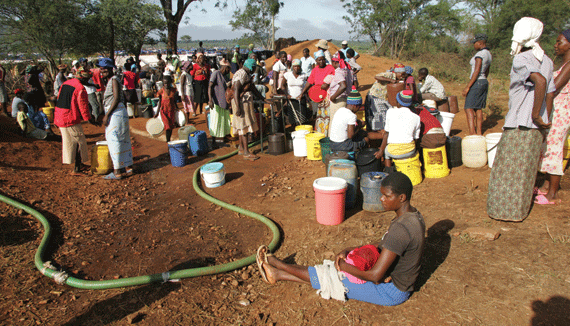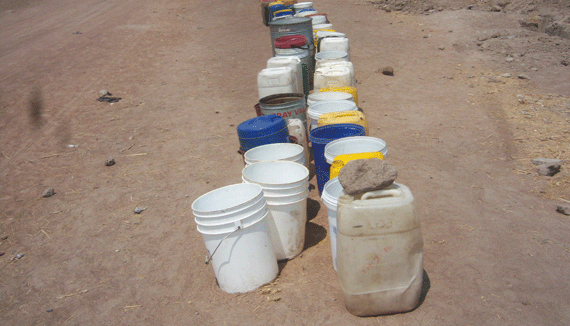
MWENEZI – They were promised a better life as sugarcane out-growers, $9 million compensation and bigger farming plots by government when some were evacuated while others were forcibly ejected by soldiers from their original homes in the Tokwe-Mukosi Dam catchment area two years ago when floods swallowed their structures in Chivi and Masvingo South communal lands, but the Chingwizi villagers are yet to enjoy any of those promises two years on.
By Tatenda Chitagu
The estimated 5 000 families spent days in the open by the roadside, surviving on bread and orange juice supplied by donors and well-wishers as their goods soaked away in rainwater, before they were hurriedly moved to Chingwizi transit camp in Mwenezi, about 150km away.
Many lost livestock, their treasured assets, and could only take with them the clothes they were wearing as they paved way for expansion of the dam, which upon completion, is set to be the country’s largest inland water reservoir.
At Chingwizi camp, they were promised “heaven on earth” by the government.
But the promised Biblical Canaan did not come and is yet to arrive two years later.
Instead, more problems mount for the villagers, while the world seems to have turned a blind eye to their plight with the looming drought ravaging nearly all parts of the country this year.
“We are the cursed lot….nobody seems to care about us. It seems everyone has forgotten that there are human beings living in inhumane conditions here,” a villager, who did not want to be named for fear of reprisals, said.
- Chamisa under fire over US$120K donation
- Mavhunga puts DeMbare into Chibuku quarterfinals
- Pension funds bet on Cabora Bassa oilfields
- Councils defy govt fire tender directive
Keep Reading
“Next month, we will clock two years living under such dire conditions. While our same old story of hardships have remained, they have been worsened this year as we are no longer receiving food handouts.

“This area is not suitable for farming and even if it were, we had no money for inputs. Furthermore, nobody could plant because of the uncertain future we faced after government said we would be moved again. Our cattle are staring death because of the drought, while some are being run over by the trains that pass through the area,” she said.
Masvingo Provincial Affairs minister Shuvai Mahofa’s office director, Kudakwashe Machako, said he was tied up when NewsDay sought a comment from him to establish whether the government had any plans for food handouts for the villagers.
Mahofa is bedridden following a suspected malaria attack last month.
Other Zanu PF sources claimed she fell sick after suspected food poisoning at the ruling party’s national conference in Victoria Falls.
The villagers have been subjected to lack of accommodation, as the few who got tents say wear and tear has affected them due to the vagaries of the weather, food and water shortages, small farming plots and lack of proper sanitation, schooling and healthcare.
To them, they will neither forget the year 2014, nor forgive the government for allegedly failing to resolve their problems.
“It is the setting that has changed, but the script remains the same,” Mavis Gwanyanya, one of the villagers, said.
“The only difference here is that it is spacious and we are not overcrowded, but we still use bush toilets. We are still facing food and water shortages as the boreholes were not drilled deep enough and are too far and the clinic is too far. We are still living in makeshift settlements and our children are struggling to go to school, as they have to walk 20km a day to school and conditions are not ideal.”
She said while they received part of the compensation – $2 million out of $9 million — not all the villagers benefited and they are still to be compensated for livestock lost, destroyed or that succumbed to diseases due to lack of pastures at the camp.
“While this is development (dam construction), it has turned out to be a curse to us who were near the dam,” she said.
“And, we wonder if we will benefit from the dam. It seems the government has forgotten us.”

Another survivor said he sees no prospect of the government improving their lives in 2016.
“Given that we are about to be moved again anytime soon, we do not see the government improving our living conditions. Our future, and that of our children has been destroyed,” he said.
At the overcrowded Chingwizi transit camp, they stayed in inhuman conditions with inadequate sanitary facilities, tents, food, disrupted schooling for pupils as well as no healthcare, leading to an outbreak of waterborne diseases as well as sexually transmitted diseases.
This forced the government to hatch a plan to decongest the camp by banning humanitarian aid agencies that had intervened from supplying food handouts.
But the villagers stayed put, demanding compensation first and four-hectare plots initially promised by the government, instead of one-hectare plots.

Several attempts to convince villagers failed, with several Cabinet ministers — among them Finance minister Patrick Chinamasa, Information minister Jonathan Moyo, ex-Local Government minister Ignatius Chombo and Lands minister Douglas Mombeshora — being chased away and heckled by the villagers.
Then government resorted to the scorched-earth policy by trying to move a clinic from the camp to where they were resettled on one-hectare plots. But that was the last straw to break the camel’s back. The villagers blocked the vehicles carrying the drugs from the mobile clinic, leading to clashes with the police.
Riot police had to fire warning shots to disperse rioting villagers, but were disarmed and two of their trucks burnt as they fled the scene.
Police reinforced and made a pre-dawn retributive attack and burnt tents and rounded up 300 suspects who were to spend several days in an open cell at Triangle Police Station after being beaten by the police and denied food.
Others fled and hid in the mountains while some trooped back to press the government for compensation.
Chingwizi camp was sealed off as the villagers had played into the government’s hands, leaving it with an excuse to force them out. Those that were not arrested were forced to move to one-hectare plots, where they were resettled nearby, while the court battle for the 29 who were accused of orchestrating the violence lasted for months.
Twenty-five of the villagers were acquitted of the public violence charges, while four villagers – including their spokesperson, Mike Mudyanembwa, and a 65-year-old woman – were jailed four years each.
The government promised to provide irrigation plots for the villagers to be sugarcane out-growers, but the promise may not be fulfilled as they are set to be moved from the area.
Mahofa last year told NewsDay that the villagers would be moved for the second time to pave way for Billy Rautenbach’s ethanol project.
The villagers last year petitioned President Robert Mugabe, and pleaded with him to come and see for himself the substandard conditions they were subjected to.










